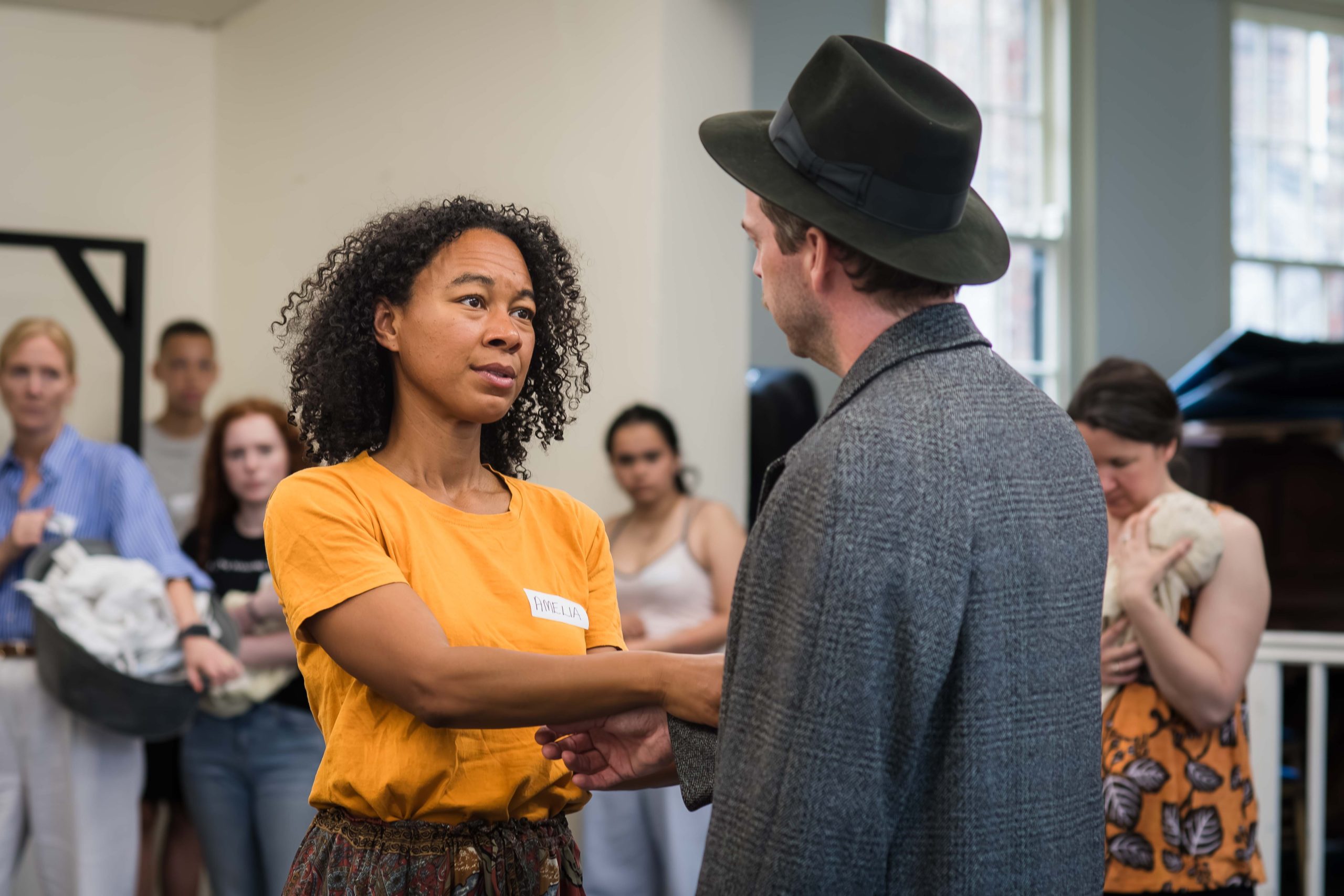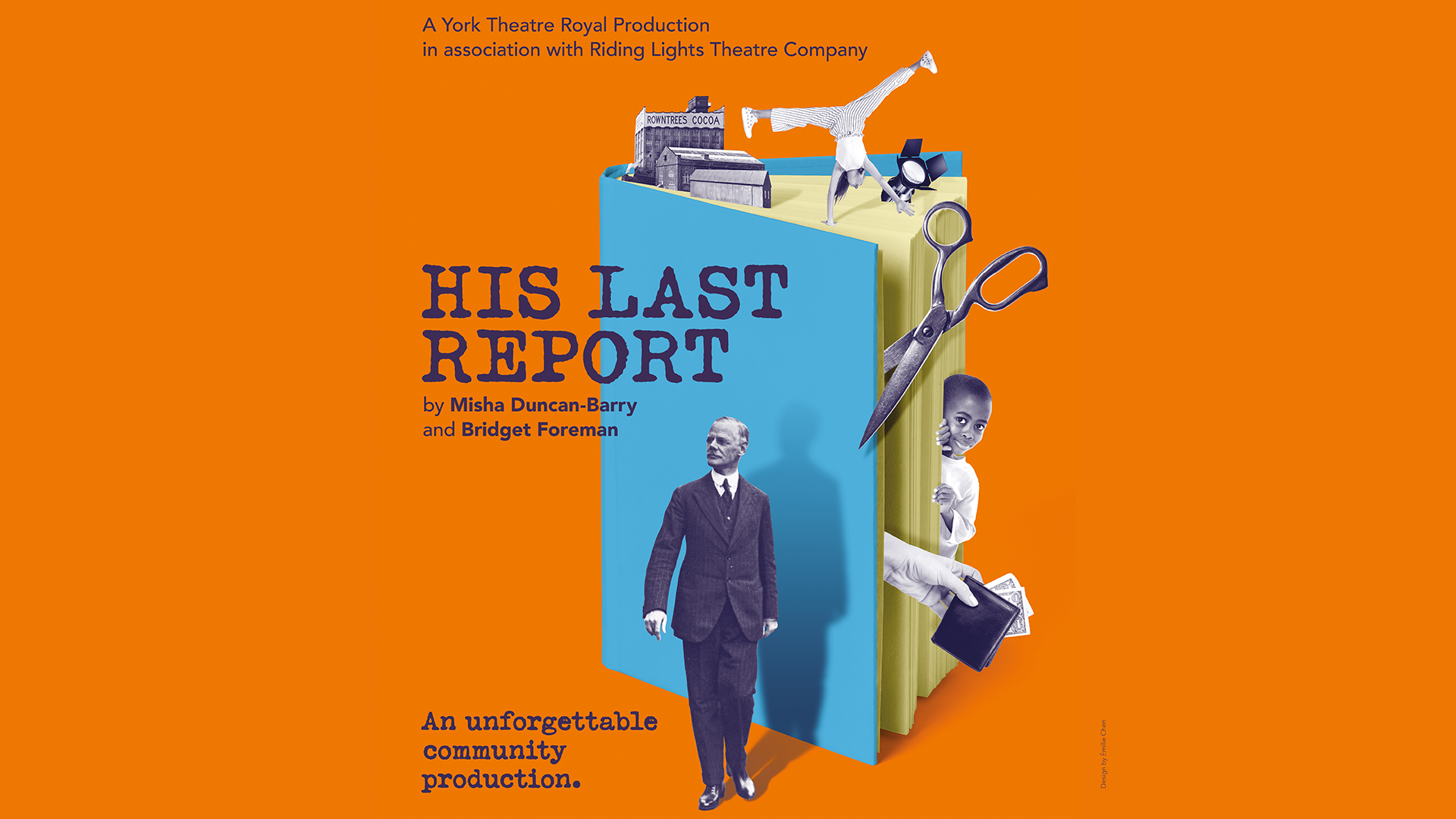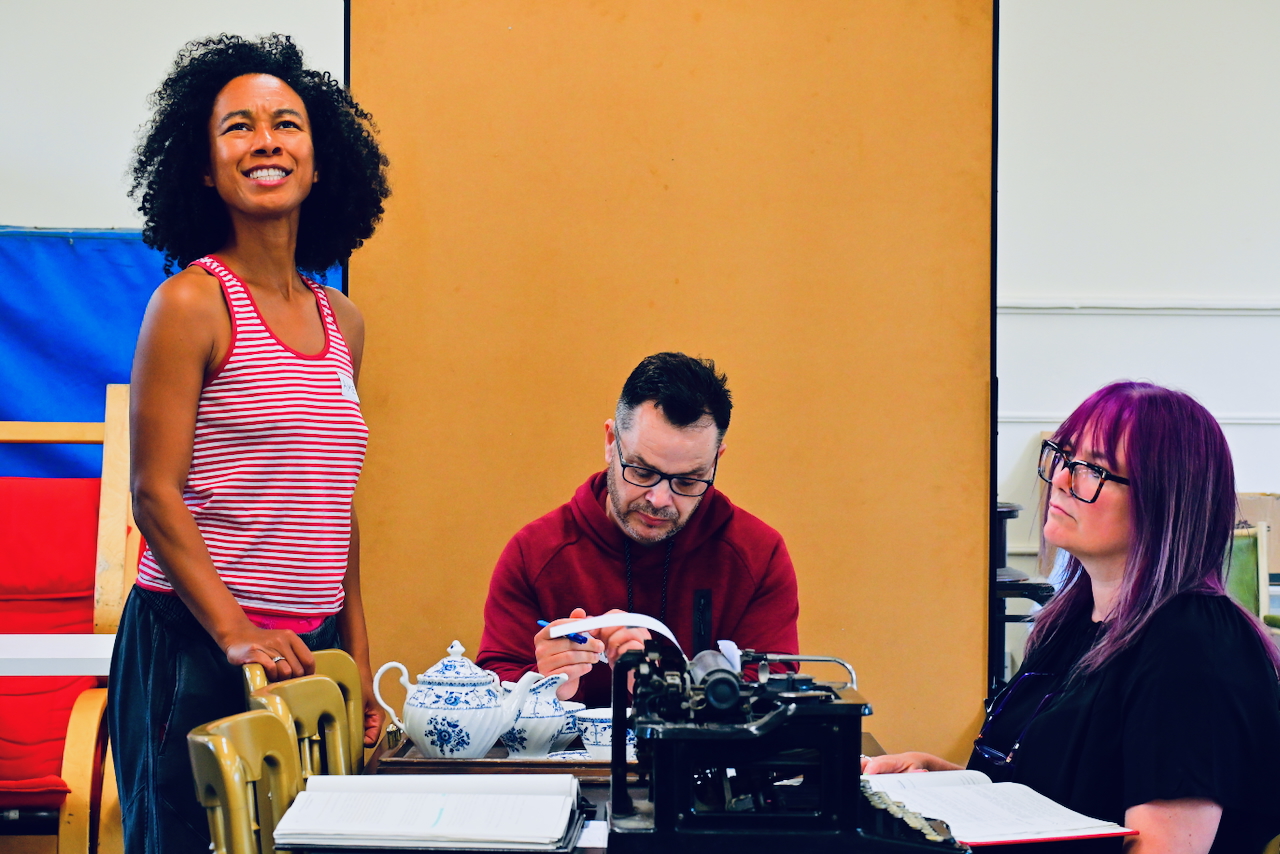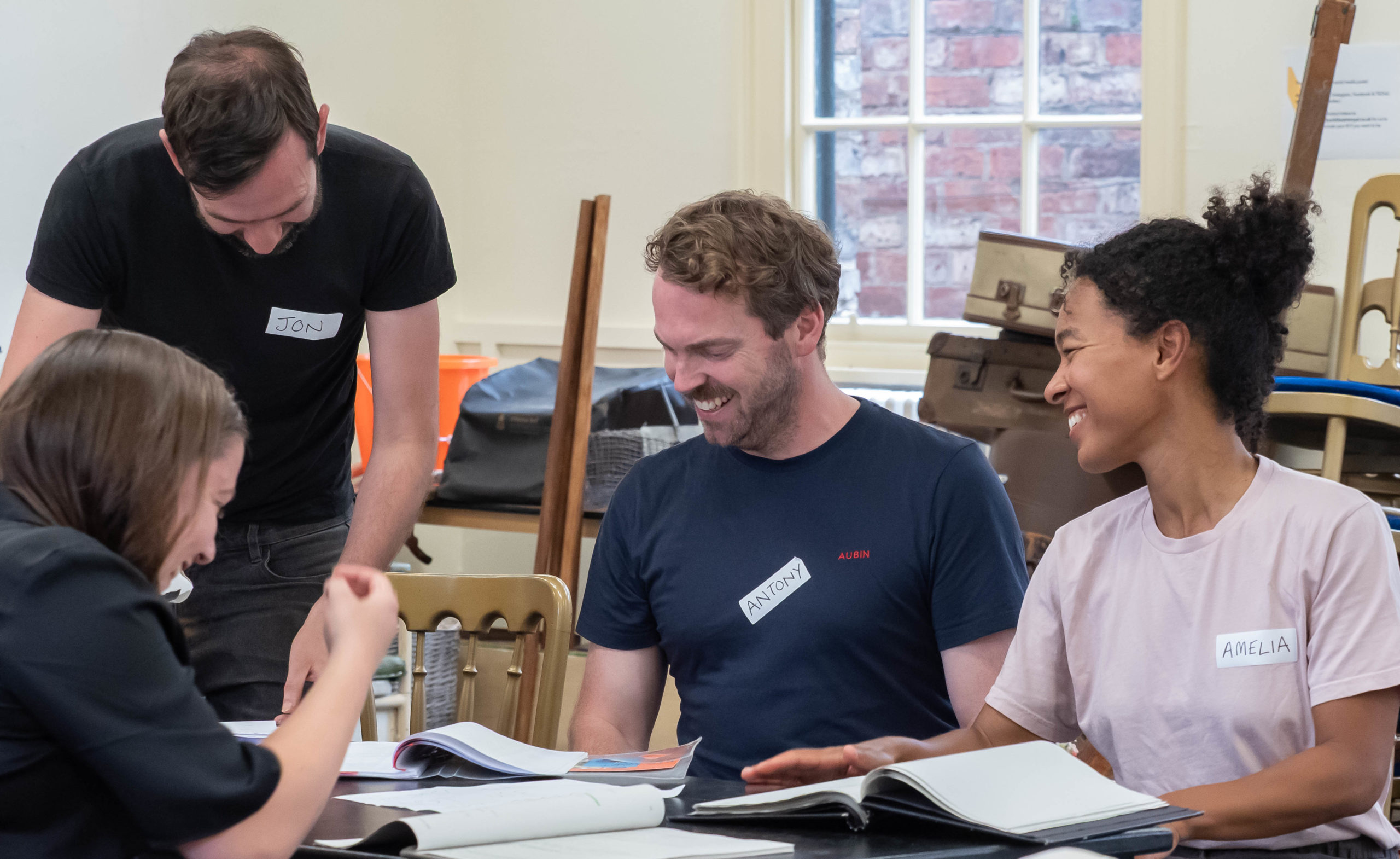

Marketing volunteer Lilian Weighell delves into the background and history of Gulie Harlock – one of the main characters of our upcoming community production His Last Report…

Photo credit: Amelia Donkor as Gulie Harlock with Antony Jardine as Seebohm Rowntree by Natasha Sinton
His Last Report is York Theatre Royal’s Community Production coming to stage this month. The scene is set in historical York as social reformer Seebohm Rowntree, and his key associates, set out to uncover the realities of living in poverty in an effort to reform the lives the working classes and to challenge common negative perception. This community production, in association with Riding Lights Theatre Company, is a comedic and heartfelt retelling of York’s social and political history which carries a poignant relevance about the struggles which still burden society today, generating impact on both a local and a national level.
The play features many of the historical influences that collaborated with Rowntree (played by Antony Jardine), such as prestigious political figures David Lloyd George and Winston Churchill, during his quest for change. However, through their impassioned writing, Misha Duncan-Barry and Bridget Foreman also uncover the life and historical significance of the play’s heroine, Gulie Harlock.

Whilst Gulie does not typically appear in the standard school syllabus alongside her confidant Rowntree, her significance within the play stands as testament to the true influence of this mostly hidden historical figure. At the heart of this production lies questions of power, opportunity, and injustice. Through this compelling retelling of Gulie’s character and her role in this vital history, co-writers Misha and Bridget highlight the importance of recounting stories from forgotten and silenced perspectives. In this way, this production resists not only the power imbalances and repressions that have shaped our history, but continue to shape our present.
As His Last Report illustrates, Gulie Harlock was an intuitive and bright woman who worked relentlessly to conduct vital, authentic research and reports about the struggles which burdened the working classes of York. Catherine Hindson, Professor of Theatre History at the University of Bristol, notes that Gulie was already “a well-qualified, professional woman who brought specialist skills, training, education, and wide experiences to her new role”[1] working with Seebohm Rowntree. As is reflected through the script, Gulie was not simply an aid to the successes of Rowntree, but an advocate and pioneer in her own right. Crucially, the character of Gulie is not simply presented as an extension of Seebohm’s narrative, but as a fundamental figure to the changing of history which the plot of the play unravels. Her multi-dimensional presence in the play, whether by her stand out comedic, and often sarcastic, one liners, or through scenes of deep sincerity and sentiment, casts her character as not only key, but as complex and notable. The play demonstrates how Harlock “had direct experience of dealing with the complexities of understanding human beings and their problems”[2] through her warm and considerate characterisation. Lead actor, Amelia Donkor, will shine centre stage as she brings these tender elements of Gulie’s character to life, masterfully animating her determined, heartfelt nature.

Amelia Donkor in the rehearsal room with community cast members Darren Barrott & Natalie Melia. Credit John Shepherdson.
Whilst Miss Harlock may not be well-known or well-documented today, this is not to say that Harlock did not receive acclaim from her peers. Notably, Rowntree dedicates a section of the introduction to Poverty: A Study of Town Life to Gulie as he writes, “especially must I express my thanks to my Secretary, Miss Harlock, who has given me the most untiring assistance throughout the inquiry.”[3] This written dedication by Rowntree gives a small insight into the close and trusting dynamic shared between these two colleagues and close friends, as well as the true influence of Harlock’s work upon the research.
In her recent interview with York Theatre Royal, co-writer Bridget Foreman reflected, “I really hope that the story will remain with people and change the way they look at the world, even just a little bit. That for me is the really exciting thing about making theatre – the way it can change people’s lives for the better.” His Last Report re-imagines the teachings and values that were championed by Rowntree and Harlock in an emotive and powerful performance which asks the audience to consider and challenge the structures of power and opportunity which continue to disproportionately affect the poorest in society. More than this however, Misha and Bridget are able to interrogate how these same structures of power and opportunity shape the versions of history we are told. By demonstrating the true impact that Gulie had upon this work, through powerful performance they are able to resist and defy these boundaries of representation which govern our understanding of history. Ultimately, this dramatic, comedic, and emotive retelling of the creation of Rowntree’s reports, resists the very structures they strove to criticise.
This reality of Gulie Harlock’s somewhat hidden history serves as a steady pulse to His Last Report. Gulie’s potent and driven influence upon the narrative reflects the true nature of her legacy, and the influence she had upon the revolutionary research that changed public perception of poverty, and provided the foundation for the modern-day welfare state. Misha Duncan-Barry and Bridget Foreman create a characterisation of Gulie which uncovers her heartfelt and determined nature, centralising her efforts as not only fundamental to the work of Seebohm Rowntree, but also as a testament to her own capabilities as an educated, caring woman. In this way, the character of Gulie Harlock represents an important truth which lies at the heart of this production, that power and the potential for change begins with the retelling of history, recognising who has been allowed to have a voice, and who has been silenced. Through this compelling and considered craft of York’s social and political history, Gulie is given the crucial remembrance and acknowledgement she has been denied so far throughout history.

Photo credit Jonathan Cook, Helen Clarke, Antony Jardine and Amelia Donkor by Mike Darley
His Last Report is at York Theatre Royal from Sat 19 Jul to Sun 03 Aug.
Find out more information and book your tickets here.
[1] Catherine Hindson, Gulielma Harlock: ‘Private Secretary and Jack of all Trades’ – The Rowntree Society, rowntreesociety.org.uk
[2] ibid
[3] B. Seebohm Rowntree, “Introduction”, Poverty : a study of town life. Wellcome Collection, p. X
Poverty : a study of town life. Wellcome Collection
Thumbnail Image Credit Natasha Sinton